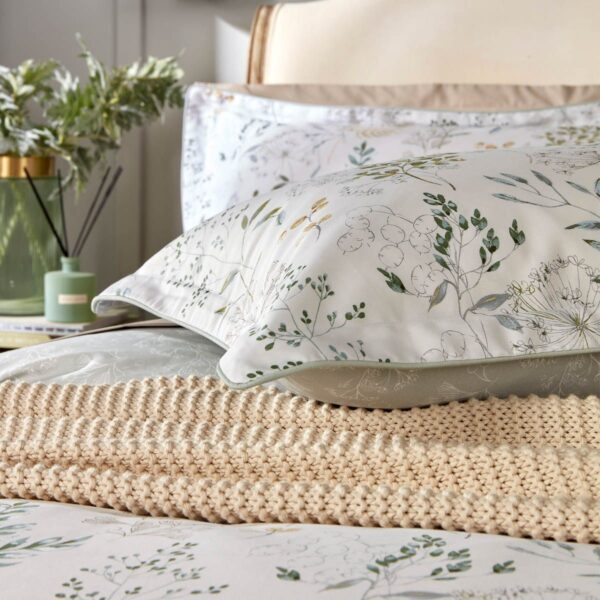
Experts Reveal Why Your Nightly Rituals May be the Key to a Good Night’s Sleep
We know a good bedtime routine is vital for children. Having nightly rituals, such as brushing teeth at a particular time and reading a book, helps children settle down to get a good amount of sleep.
As we grow up and have control over how we spend our evenings, it can be easy to fall out of a routine, resulting in poor sleep hygiene, even though the habits we had as a child can still be beneficial to us now.
Lucy Ackroyd, Head of Design at luxury linen company, Christy, has teamed up with Suzy Glaskie, functional medicine health coach at Peppermint Wellness, to discuss the importance of good sleep hygiene and suggest ways you can establish the perfect bedtime routine.

What is sleep hygiene?
The NHS describes sleep hygiene as “‘the healthy habits that you can practice to help you get a good night’s sleep”. In essence, this means having a solid routine in place to ensure you get consistently good sleep.
Suzy explains: “Most of us fail to prepare for sleep in the way we need. Working or scrolling right up until we switch out the light means that we’re trying to fall asleep in a state of stimulation when our body is still in the stress response.
“We actively need to prepare for sleep by giving our mind and body the signal that it’s safe to switch off. The good news is that, by making just a few simple tweaks to your lifestyle and bedtime routine, you can boost your chances of getting a better night’s shut-eye.”
How to achieve the perfect routine
Knowing when to settle
In adult life, the time you switch off the lights and commit to sleep can flip-flop. While having a specific time you go to sleep may not be realistic, instead consider around what time you want to start slowing down and easing into your routine.
Suzy says: “The experts say we need 7 – 9 hours of sleep every night. It’s far better to get this sleep earlier rather than later, so going to bed at 1 am and sleeping for 8 hours is not optimum.”
“I recommend turning out the light at some point between 10 and 11 pm would be far more effective in giving you the restorative sleep we all need to thrive. Therefore I would suggest you start slowing down and implementing your routine around 8/9 pm.”
Choosing what will work best for you
To build a strong bedtime routine you should follow the non-negotiables; the things that experts believe are an absolute must in order to achieve good sleep hygiene. Then you can decide which of the recommended rituals you believe will be the most beneficial to you and work around your schedule.
Understanding the non-negotiables
Create the perfect environment
There are many elements that need to be considered in order to create the ideal environment for you not to just fall asleep, but stay asleep too.
Suzy shares how to do just that: “Make sure your room is completely dark, free of clutter and cool (around 18 degrees). If you don’t have black-out curtains, buy yourself a sleep mask and see what a difference it makes. Try using earplugs or play white noise to block out disruptive sounds.”
Lucy adds: “Another thing to consider is making sure that you have the right tog duvet for the time of year – being too hot or cold is enough to keep you up at night.
“Understanding your own personal needs is crucial. If you’re quite a sweaty sleeper, opt for more breathable duvets and bedding, or if you’re on the other end of the scale and get quite cold at night, heavier duvets that retain heat will work best to keep you warm.”
Invest in quality
It makes a difference to have the most comfortable bedding, including pillows and mattresses, that you can afford. Your bed should be an inviting, calming sanctuary that invites sleep and leaves you feeling rejuvenated the next day.

Suzy says: “Human beings are designed to spend a third of their life asleep – that in itself underscores how vital sleep is to our entire wellbeing. Optimising our bedroom environment makes sense when you consider how crucial sleep is and how much time we spend in our beds.”
Lucy advises: “Opt for pure cotton, high thread count linen which will help regulate temperature and moisture levels. Plus, they will feel much smoother against the skin than synthetic offerings.”
Minimise tech use
The way you use technology before bed can make it both difficult to fall asleep and wake up in the mornings, due to the blue light they emit.
“It’s best to keep your bedroom tech-free. I’d recommend avoiding screen time for an hour before going to bed. If you have to look at a screen, buy yourself some special glasses that screen out the blue light.
“Be aware that checking your inbox or scrolling through social media stimulates the brain, which is absolutely not conducive to falling asleep,” Suzy warns.
Watch what you eat
You may have been told that eating cheese before bed causes nightmares, and while that might not quite be true, eating certain foods before bedtime can definitely impact your sleep.
Suzy suggests: “You should stop eating 3 hours before sleep, and avoid caffeine in the afternoon/evening. Keep an eye on the alcohol too – it wrecks our sleep. Also, avoid sugary snacks – they’ll raise your blood sugar, making it harder to drift off.”
The recommended rituals
To help you drift off, Suzy has provided her top 3 sleep rituals that you should practice before going to bed:
1. Take time to meditate
Meditation is a great way to start winding down into a state of relaxation. Focusing on your breathing and slowing down should help you reach the perfect state of sleepy, whilst also being beneficial for your mental well-being.

Suzy advises: “A ten-minute meditation or breathing practice is the perfect bridge between a busy day and sleep. If you struggle to meditate by yourself and get easily distracted, try following a guided meditation that you can find online.”
“Another way to let the day go is to lie on your back with your legs straight up against a wall, or move through a gentle yoga flow – both these practices are very grounding and calming.”
2. Practice Gratitude
Harnessing positive thoughts before you go to bed is believed to soothe you, making it easier to fall asleep by letting go of any tension you may have been holding throughout the day.

Suzy states: “A gratitude practice is a powerfully effective way to switch off from the stresses of the day and encourage better sleep: simply keep a notebook next to your bed and write down three things that you’re grateful for from that day.”
“It doesn’t have to be anything super crazy, it could just be that the sun was out or perhaps you saw a cute dog on your commute to work – taking notice of the small things can help to remind you of the simple pleasures in life.”
3. Wash away the day
Taking time to indulge in self-care, for example completing a skincare routine or soaking in a hot bath, is a lovely way to prepare for sleep.

“I recommend adding magnesium-rich epsom salts and a few drops of lavender oil to your bath – it really does help to release tension and help you to fall asleep more quickly. The hot water lowers your body’s core temperature which, in turn, helps signal to the body that it’s time for bed,” says Suzy.
Lucy adds: “To make this even more indulgent, wrap yourself in some high-quality fluffy towels which will leave you feeling hugged by a cloud. Prioritising nightly self-care is the perfect way to spend quality time with yourself, taking care of both body and mind.”













































